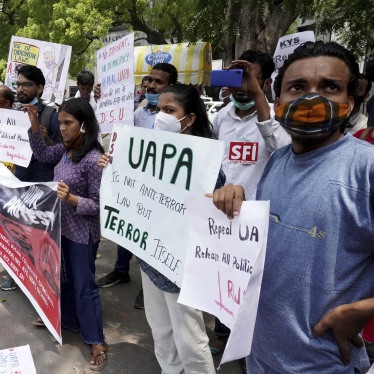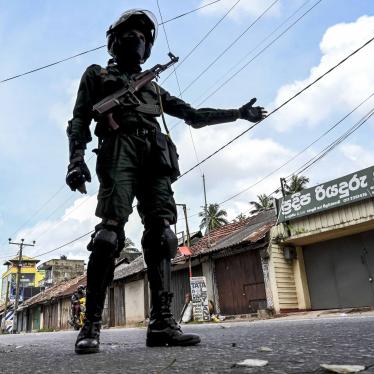(New York) – Independent observers and monitors should be allowed to investigate the latest raid by Chinese authorities in the Xinjiang region, which reportedly left 28 people dead, Human Rights Watch said today. Clarifying facts on the ground is essential in order to determine whether excessive force was used.
On November 20, 2015, the state-run Xinjiang Daily reported that 28 “thugs” had been “annihilated” and one had surrendered in a raid in Aksu Prefecture, the apparent culmination of a 56-day operation. The report accused the individuals of involvement in an attack on a coalmine in Aksu on September 18, and said they were directed by a “foreign extremist group.” The September attack led to deaths of 11 residents and 5 police officers, and injured 18 people.
On November 17, Radio Free Asia had reported that three of those killed in China’s November raid were children and gave different casualty figures, raising questions about how the raid had been conducted and why lethal force was used. Similarly conflicting reports by other international media outlets after comparable past raids have also differed from the state media’s coverage.
“Violence aimed at terrorizing the population is always utterly deplorable, but it does not shield the government’s response from scrutiny. The death toll in China’s counterterrorism campaigns is deepening skepticism about Beijing’s tactics and goals,” said Sophie Richardson, China director at Human Rights Watch. “If China truly has nothing to hide, then it is past time to allow United Nations experts, independent journalists, diplomats, and other observers free access to the region to examine all such incidents.”
A number of violent attacks have killed residents in Xinjiang Uighur Autonomous Region in recent years. In May 2014, bomb blasts in Urumqi, the regional capital, killed at least 30 people and wounded more than 90, according to state media. Although no one claimed responsibility, state media suggested the attack was the work of “terrorists,” and similar allegations were made about violent attacks in Kunming, Yunnan Province, in March 2014.
Other incidents in Xinjiang characterized by state media as “terrorist” attacks also appear to have involved significant casualties with minimal explanation as to the circumstances of the incident or the background of the assailants:
- In July 2014 in Shache County (known as Yarkand in Uighur), near Kashgar, a group of people allegedly attacked a police station. Xinhua reported that police fired on the attackers, killing “dozens”;
- In September 2014 in Luntai County, six people were reportedly killed and 54 injured in a series of blasts. State media claimed the authorities killed 40 alleged attackers and captured two; and
- In April 2013 in Bachu County (or Maralbexi County), 15 officials were reportedly killed. State media reported that the authorities killed 6 alleged attackers, captured 8, and apprehended 11 more later.
China’s central government and Xinjiang authorities also tightly control visits to the region by diplomats and journalists, making verification of the circumstances surrounding these incidents virtually impossible. Journalists who have tried to travel to the sites of recent violent incidents have been stopped at checkpoints, and in some cases been prevented from filming or staying at hotels. The region has few domestic rights activists or independent lawyers who are able to work without fear of reprisals.
Chinese authorities have a duty to both protect public order and to respect the rights of both suspects and the general population. The United Nations Basic Principles on the Use of Force and Firearms by Law Enforcement Officials, which reflect customary international law, require law enforcement officials to use nonviolent means as far as possible and to use intentional lethal force only when strictly unavoidable to protect life. The principles also require governments to ensure that arbitrary or abusive use of force and firearms by law enforcement officials is punished as a criminal offense under their law.
Suspects taken into custody should have immediate access to legal counsel, be promptly brought before a judge, and fairly charged or released, Human Rights Watch said. In the past, the Chinese government has provided little information or failed to reveal the whereabouts or well-being of those detained on terrorism or separatism charges, in violation of international law. This includes a group of 100 Turkic people forcibly repatriated to China in July 2015 from Thailand, whom the Chinese government claimed were on their way to “join jihad.”
On November 17-18, 2015, China reiterated its commitment to cooperate with United Nations human rights mechanisms, and to uphold the rights of ethnic minorities. It should allow an independent inquiry into the recent violence in Xinjiang. An urgent appeal and joint report could further be undertaken by relevant UN special rapporteurs, for example on minority issues, on freedom of opinion and expression, and on human rights in counterterrorism. The dozen governments that maintain bilateral human rights dialogues with China should request briefings on the raids, and refrain from pursuing cooperation with China on terrorism until the facts of these incidents are independently verified.
The Uighurs are Xinjiang’s predominantly Muslim minority. Central government-driven economic development and a massive influx of ethnic Han Chinese migrants to Xinjiang, alongside state hostility toward the Uighurs’ distinctive cultural, linguistic, and religious identity, have contributed to deep resentment in the region. Over the past decade, Chinese authorities have increasingly treated peaceful criticism of the government or expressions of distinct Uighur identity as evidence of “separatism, splittism, and terrorism,” crimes that under Chinese law can carry the death penalty.
“After the Paris attacks Chinese Foreign Minister Wang Yi called on the world to end ‘double standards’ and acknowledge China’s terrorism problems,” Richardson said. “But Beijing undermines its credibility by strangling access to Xinjiang, and the only way to regain it is to allow independent investigations.”








